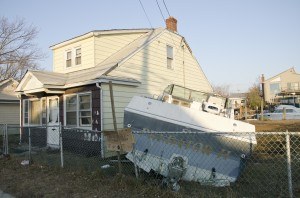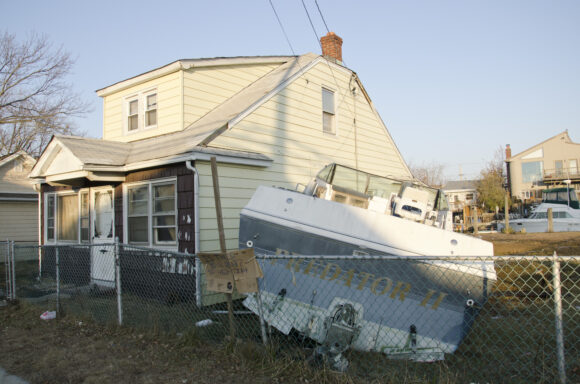Garbage trucks, hulking military vehicles and mud-caked cars move slowly through a Staten Island waterfront neighborhood still reeling from Superstorm Sandy’s storm surge. Then comes an outlier: a spotless SUV with three passengers peering out windows at a mangled home choked with sea grass.
Residents recognize the occupants right away. They’re disaster tourists, people drawn to the scene of a tragedy to glimpse the pictures they’ve seen on television come to life.

Two weeks after the superstorm socked the region, cleanup continues in New York and New Jersey, which bore the brunt of the destruction. At its peak, the storm knocked out power to 8.5 million in 10 states, and some during a later nor’easter. About 73,000 utility customers in New York and New Jersey remained without power late Sunday, most of them on Long Island.
But the storm didn’t just bring darkness and despair; it also brought the gawkers.
“It’s a little annoying,” said Chris Nasella, who paused as he finished cleaning up a home reduced to a shell on the first floor. “By the same token, I would do it, too. I don’t think anyone wouldn’t want to look at boats that are picked up and left on the streets. As long as you don’t get a kick out of it, it’s an amazing thing.”
There weren’t many tourists in Nasella’s neighborhood on Saturday. Cleanup crews had done some extensive work. The neighborhood is only accessible through streets clogged with idled cars in gas lines and traffic made deliberate by still-powerless traffic signals.
But they left an impression.
“The gawking was amazing last week,” said Joanne McClenin, whose home was filled with water five feet high on the night Sandy came ashore. “It was kind of offensive as a homeowner, because I felt violated.”
As the power outages on Long Island drag on, New Yorkers railed Sunday against the utility that has lagged behind others in restoring power, criticizing its slow pace as well as a dearth of information.
Separately, U.S. Secretary of Homeland Security Janet Napolitano visited with disaster-relief workers Sunday in Staten Island’s Midland Beach neighborhood, which is still devastated two weeks after Sandy hit.
The lack of power restoration for a relative few in the densely populated region at the heart of the storm reinforced Sandy’s fractured effect on the area: tragic and vicious to some, merely a nuisance to others.
Perhaps none of the utilities have drawn criticism as widespread, or as harsh, as the Long Island Power Authority. Nearly 67,000 of the homes and businesses it serves were still without power late Sunday. That was almost all of the remaining outages in New York state.
“We certainly understand the frustration that’s out there,” LIPA’s chief operating officer, Michael Hervey, said in a conference call late Sunday. But, he said, the storm had been worse than expected, no utility had as many workers in place beforehand as it would have liked, and the power was coming back rapidly “compared to the damage that’s been incurred.”
“I was so disgusted the other night,” said Carrie Baram, 56, of Baldwin Harbor, who said she calls the utility three times a day. “I was up till midnight, but nobody bothered to answer the telephone.”
LIPA has said it knows that customers aren’t getting the information they need, partly because of an outdated information technology system that it is updating. Sunday, executives said they were working on setting up information centers near the most heavily damaged areas. The company also said it had deployed 6,400 linemen to work on restoring power, compared to 200 on a normal day.
“‘They’re working on it, they’re working on it’ – that would be their common response,” Nassau County Executive Ed Mangano said Sunday, describing LIPA’s interaction with his office.
He said LIPA had failed to answer even simple questions from its customers and that Sandy’s magnitude wasn’t an excuse.
On Staten Island, Napolitano said “a lot of progress” had been made since the storm hit and especially since her last visit 10 days earlier.
“It seems like a different place,” she said. “You can really tell the difference.”
But, she added, there was a lot more to do. “The last big chunk” to solve, she said, is the question of how quickly power can be returned to thousands of homes without it.
If homes are not inhabitable even after power returns, she said, the government is finding temporary apartments and hotels where evacuees can stay – preferably in the same community so kids can continue going to the same schools.
On Staten Island’s streets, many of the volunteers who carried garbage cans and shovels, or pushed grocery carts filled with supplied carried mobile phones with them and, like Chelsea Chan, paused to take pictures of the damage. Chan said she was taking the pictures for her father who was in another part of New York City and unable to see the damage for himself.
Seaver Avenue on Staten Island was sloppy with mud, sand and curbside mounds of couches, personal photos, mattresses and sodden sheetrock. Mickey Merrell’s front porch was askew, and the storm surge nearly knocked a neighbor’s house into hers. Across the street a house was washed off its foundation. It was a scene of human misery – and one of New York City’s new attractions, just like the construction crane that collapsed and dangled precariously high above mid-town Manhattan on Oct. 29.
“Sometimes it’s like we’re at the zoo,” Merrell said. “So many people come and stop and stare at this place.”
Michelle Van Tassel, a Staten Island resident who has friends who lost everything, said she tried to deliver supplies but couldn’t get through because there were so many people on the street who had no business being there.
“There were a tremendous amount of people who came into the borough to take pictures, to look at the devastation themselves, and it seemed like more of a tourist attraction down there than it actually felt like people who were trying to help,” she said, her voice breaking.
Peter Lisi, a renter who is fighting a landlord trying to evict him from his damaged home, said he doesn’t mind the gawkers, “as long as they’re not making fun.” Some of them are drawn in to what’s happening and help, he said.
Domenick and Kim Barone said they could tell the tourists apart from the volunteers because the gawkers’ clothes and shoes are clean, and they’re often snapping pictures.
“Obviously they have nothing else to do,” Kim Barone said. “If this is their source of entertainment, to wallow in other people’s despair, I don’t have the time. I’m trying just to clean out and save what I can save. I don’t really have the time to worry about them.”
(Associated Press writers Michael Hill and Deepti Hajela contributed to this report.)
Was this article valuable?
Here are more articles you may enjoy.


 These Five Technologies Increase The Risk of Cyber Claims
These Five Technologies Increase The Risk of Cyber Claims  Navigators Can’t Parse ‘Additional Insured’ Policy Wording in Georgia Explosion Case
Navigators Can’t Parse ‘Additional Insured’ Policy Wording in Georgia Explosion Case  Tesla Sued Over Crash That Trapped, Killed Massachusetts Driver
Tesla Sued Over Crash That Trapped, Killed Massachusetts Driver  Portugal Rolls Out $2.9 Billion Aid as Deadly Flooding Spreads
Portugal Rolls Out $2.9 Billion Aid as Deadly Flooding Spreads 